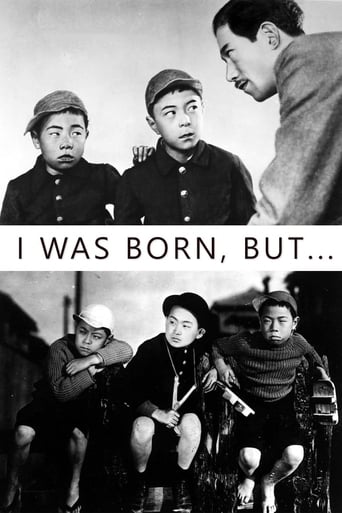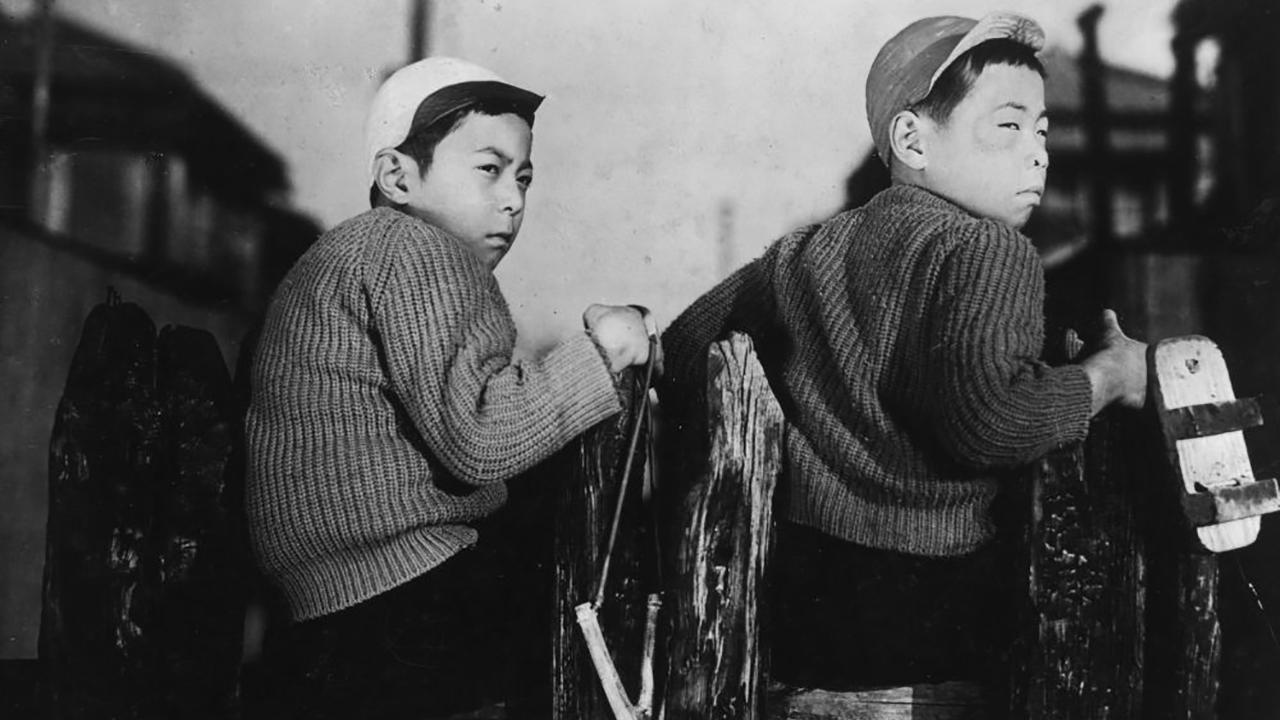lasttimeisaw
This Ozu's early silent film was made when he was only 29, at a formative age, he has already acquired a keen eye on sieving the callous doctrine of the society's pecuniary pecking order through the lens of two kids' growing dismay and perplex. Two school-age brothers Ryoichi (Sugawara) and Keiji (Aoki) are moving to suburbs with their parents, a shrewd move of their father Yoshi (Saitô, a virtuoso player jostle between primness and clownishness) to hobnob with his boss Iwasaki (Sakamoto). With a good salary, they can afford a better life here, but the boys have some difficulty to find their feet, especially when they are picked on by school bullies, led by a bigger kid (Iijima), they play truant and laze around, ask an older delivery boy (Kofujita) to forge teacher's signature, all child's play and they would be reprimanded by Yoshi when the lid is blown off. Nevertheless, Ozu applies a very gentle touch and a ludic attention in limning the boys' daily expediency to tackle with their problems (there are not enough sparrow's eggs in the world to beat their bully), and eventually the scale would be tipped when they are wise enough to crack the knack of how to succeed in becoming an alpha dog, even Taro (Katô), Iwasaki's son, has to pay deference to the boys' whims. (a children's game but so rapier-like in its connotation linked to the power struggle in the adult world.) Then comes a blow, during a friends-gathering in Iwasaki's place, where films of daily vignettes are screened, a galling discovery would inflame the brothers' chutzpah to brazenly question their father's authority, "are you a successful person?", "why can't you be successful?", it is a blow to the brothers' unwitting but vaunted ego, which certainly doesn't tally with their young age, and is a corollary of a society spurred and indoctrinated by sheer competition and capitalism, even for kids, they are possessed with the idea of supremacy, power and hubris, which outstrips the parameter of childish mischief. In retrospect, the film grants us a gander into the frame-of-mind of a pre-WWII Japan, but not prescient enough to pinpoint a more perspicacious outlook, instead, an anodyne finale betrays Ozu's own perspective at that time. The children in the film are well-trained scamps, endearing to watch, especially Tomio Aoki as the younger brother, transforms the disadvantage of his less photogenic looks into something archly expressive with all the gurning, imitating and feigning, a farceur is in the making. A minor grouch to Donald Sosin's persistent attendant score, a relentless cascade of tunefulness can certainly overstay its welcome. Anyhow, a lesser comedy branded with Ozu's name is still worth visiting, not the least for the sake of his masterful tutelage and coordination of his exuberant pupils in front of the camera.
WILLIAM FLANIGAN
Viewed on DVD. Restoration = seven (7) stars. There's an old saying in acting circles: Never do a scene with a baby (or a dog) unless you want that scene stolen. In this film it's kids (and a dog). And the adult actors suffer big time both in the slice-of-life story line and by being constantly upstaged on screen. (And their characters don't look especially happy about matters.) This is a deliciously outrageous film about precocious preteens, but meant for entertaining grown ups (who may also be dealing with unruly kids in the midst of a major cultural upheaval). Just under a dozen child actors are on display with at least two in virtually every scene. Not only do they carry the film, they are the film! Many juveniles you have seen before (and will see again) in the director's movies. The film, though, is too long by at least a third and continuously grows in tediousness and repetition. Several of the director's trademarked shots of white under garments drying on clotheslines are on display plus electric train engines that constantly flash by (they seem to be blown-up models in rear-screen projection) for no apparent reasons (other than to, well, add flash). The restoration is OK, but wear and deterioration artifacts are visible here and there. Piano score is fine. Bottom line: Fun to watch for about an hour, but ... . WILLIAM FLANIGAN, PhD.
Claudio Carvalho
In the 30s, a low middle-class family composed of the father (Tatsuo Saito), the mother (Mitsuko Yoshikawa) and two little sons (Hideo Sugawara and Tomio Aoki) has just moved to a suburb of Tokyo. The two brothers have some sort of adaptation problem with the kids in their neighborhood, but they feel protected with their beloved father, and they become leaders of the gang of boys. Their father is a clerk in an office, and his director lives in the same neighborhood, and he tries to be promoted in his job being a servile flatterer of his boss. One night, the boys find that his father has a silly behavior in his job to please his boss, and they lose the respect for their father, questioning him why he can not be the director of the company.This is the first movie of Yasujito Ozu that I have watched, since none of his films has been released on video or DVD in Brazil. This month, a Brazilian cable television is presenting four movies of this great director. I was really impressed with such powerful and heartbreaking fight of classes' familiar drama. I was expecting a movie like François Truffault's "Les Quatre Cents Coups", or Luis Buñuel's "Los Olvidados", or Hector Babenco's "Pixote: A Lei do Mais Fraco". However, the story is not focused in juvenile delinquents, but only low-middle class children and the specific drama of a worker's family, when the little boys do not understand the social hierarchy and why their father is not better than the father of one boy of their gang. The performance of the cast is very natural, and the direction is amazing, having an adequate pace and transmitting the sensations and feelings of the characters without sound to the viewers. My vote is ten.Title (Brazil): "Meninos de Tóquio" ("Boys From Tokyo")
ketchkev
I am so glad that I ran into this movie. It left such an impression on me. The way it ended was so suprising. The boy's father was such a nice guy, and how that boy could be ashamed of him like that was really something else. It just left me in tears in the end of the movie. It makes me realize what our parents had to do to make a good living, even if it takes having to sell out your pride. His father did it because he loved his family. There is a lesson to be learned in this, and I would recommend this film in a heartbeat!


 AD
AD

